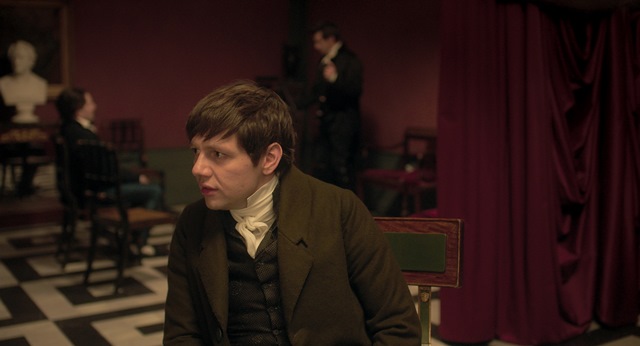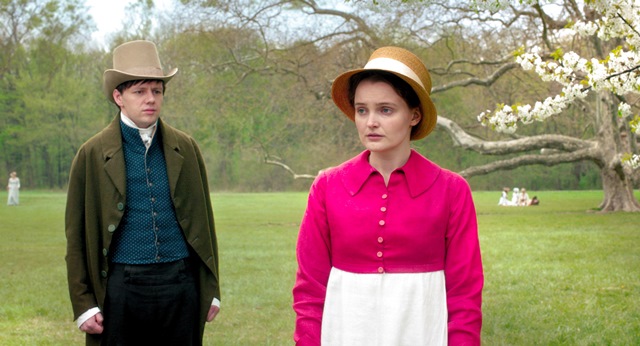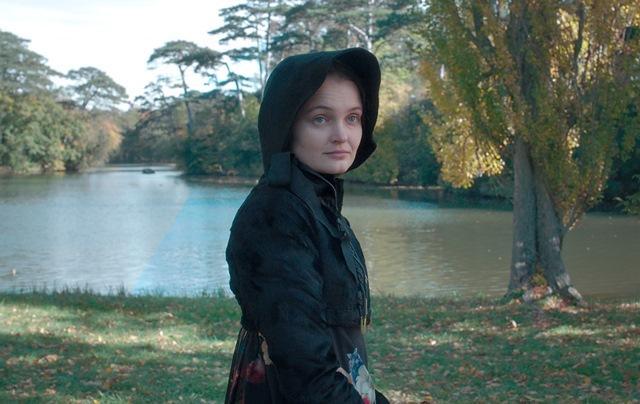Bringing a real-life story with a well-known and shocking outcome to the screen has an inherent major difficulty. When the end does come, it won’t shock. Amour Fou dramatises the suicide pact of the German writer Heinrich von Kleist and Henriette Vogel, a woman at the heart of high society who had been diagnosed as terminally ill. They both died on 21 November 1811.
Amour Fou solves the problem of being burdened with an in-built spoiler by assembling a cast whose engrossing performances are enacted as if under hypnosis and by devising a mise-en-scène so striking that it becomes as important to the film as the characters and story. Visually, Amour Fou is as dreamlike as the states affecting its languorous protagonists.
 Austrian director Jessica Hausner’s last film, 2009’s Lourdes, similarly dealt with the real-life and the nature of belief. In that case, it was a current-day pilgrimage to Lourdes and what may or may not have been a miracle. With Amour Fou, Christian Friedel – even more detached than in The White Ribbon – as von Kleist (pictured right) drifts through his days proclaiming that “the world itself troubles my soul”. “The present has no appeal for me,” he declares. Daylight pains him. Death is the only option to deal with his problem so he asks women to join him. He will shoot them first, then himself. Not surprisingly, his offer is usually rejected. Then he meets the married Henriette Vogel (a spectral Birte Schnöink). She is fascinated by his poetry and its transgressive themes. Turmoil lies behind her impassive countenance. After she is diagnosed as terminally ill, Henriette accepts his invitation to die alongside him.
Austrian director Jessica Hausner’s last film, 2009’s Lourdes, similarly dealt with the real-life and the nature of belief. In that case, it was a current-day pilgrimage to Lourdes and what may or may not have been a miracle. With Amour Fou, Christian Friedel – even more detached than in The White Ribbon – as von Kleist (pictured right) drifts through his days proclaiming that “the world itself troubles my soul”. “The present has no appeal for me,” he declares. Daylight pains him. Death is the only option to deal with his problem so he asks women to join him. He will shoot them first, then himself. Not surprisingly, his offer is usually rejected. Then he meets the married Henriette Vogel (a spectral Birte Schnöink). She is fascinated by his poetry and its transgressive themes. Turmoil lies behind her impassive countenance. After she is diagnosed as terminally ill, Henriette accepts his invitation to die alongside him.
Hausner plays the film as a surreal comedy of social manners. Heinrich and Henriette’s first retreat from Berlin to enact the plan is thwarted when an associate of her husband happens to be staying at the same inn. Vignettes focus on discussions about whether imported French notions of democracy have any place in an ordered Germanic world in which the state is revealed to be financially bankrupt. Notions of the aristocracy paying taxes are anathema though. Evenings are spent in exquisite rooms stiffly listening to musical performances. At these salons, Heinrich recites his poetry.
This satire looks amazing. Each set up is precisely configured, as if the characters are situated in tableau vivants. There are very few camera pans, and no zooms. While the main characters are in sharp focus, everyone else and their setting is a blur: a neat visual metaphore for self-obsession.
 Friedel and Schnöink hold their own impressively alongside the meticulous visuals. He – looking uncannily like contemporary illustrations of von Kleist – is mannered and given to delivering his doomy, grandiose, tortuously worded statements with a disconcerting impassivity. He seems absurd. Schnöink plays Henriette as both naïve – she says she is her husband’s property – and knowing. Although he does not take her up on it, she tells the poet he can enter a room when she is wearing just her slip. Both play their parts with a distance that the real-life characters must have felt towards the day-to-day.
Friedel and Schnöink hold their own impressively alongside the meticulous visuals. He – looking uncannily like contemporary illustrations of von Kleist – is mannered and given to delivering his doomy, grandiose, tortuously worded statements with a disconcerting impassivity. He seems absurd. Schnöink plays Henriette as both naïve – she says she is her husband’s property – and knowing. Although he does not take her up on it, she tells the poet he can enter a room when she is wearing just her slip. Both play their parts with a distance that the real-life characters must have felt towards the day-to-day.
If there is a problem with Amour Fou, it is not that it rewrites historical detail – it was actually Vogel who invited von Kleist to join her in death – it is this distance. The measured film unfolds with few peaks and troughs, its atmosphere coloured by von Kleist’s ennui.
In Amour Fou’s rendering of Heinrich von Kleist and Henriette Vogel, the passions which drove the pair to their death were expressed with the energy of a tractor reversing through a swamp. If their love was – as the title proposes – indeed mad, it was an exceedingly understated madness.
Overleaf: watch the trailer for Amour Fou
Watch the trailer for Amour Fou















Add comment